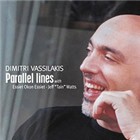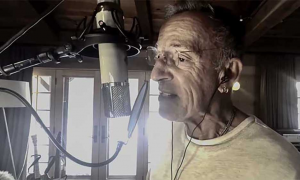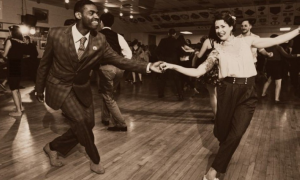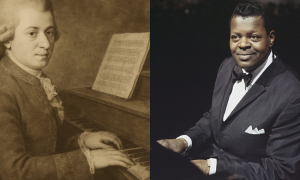Home » Jazz Articles » Opinion » More Music, Less Opportunity?
More Music, Less Opportunity?
I
 We live in extraordinary times. Relatively recently a phenomenal number of types of music have taken form: blues, jazz, rock 'n' roll, country, reggae, soul/r&b, bossa nova, samba, soukous, salsa, gospel, hiphop, free improv (to name a few). Atonalism, noise, electronics, computer language are now a part of many musicians' lexicon. The future is approaching at 1000 times the speed of its counterpart in, say, 1805. As all these models intertwine, giving rise to innumerable permutations, the modern notion of 'eclectic' or 'hybrid' becomes superfluous. Musicians are currently describing our country's present and future, though few fellow citizens are listening.
We live in extraordinary times. Relatively recently a phenomenal number of types of music have taken form: blues, jazz, rock 'n' roll, country, reggae, soul/r&b, bossa nova, samba, soukous, salsa, gospel, hiphop, free improv (to name a few). Atonalism, noise, electronics, computer language are now a part of many musicians' lexicon. The future is approaching at 1000 times the speed of its counterpart in, say, 1805. As all these models intertwine, giving rise to innumerable permutations, the modern notion of 'eclectic' or 'hybrid' becomes superfluous. Musicians are currently describing our country's present and future, though few fellow citizens are listening. In my catholic view of jazz, I see incredible promise in this multi-skinned, poly-voiced, inter- tribal energy: everywhere throughout the world and within our own borders, there are creative souls who want to be part of jazz, who bring Latin, Asian, African, Nordic, Native American sounds to it. This is inevitable and its self-propelling motion defies anyone to hold jazz back, to own or circumscribe it. Some will choose not to call a lot of this new music jazz - it doesn't matter. We don't have to call, say, Henry Threadgill's music jazz to know and admire the fact that there is a galaxy of fascinating influences in his life work.
There are still people who act as if the intersection of, say, rock and jazz, or Chinese folk song and jazz, is odd or unusual and I find that amazing. For me and every single jazz player I feel close to, these 'hybrids' have been going on for years, maybe even forever and are simply the result of who we are as people. When you love more than one kind of music, really love it, the love permeates your style and becomes part of your voice. Amongst all musical streams jazz is the most advanced in its ability (quoting Stanley Crouch) to integrate "high intellect and country soul . Its inventors endowed it with properties that have allowed us, its younger adherents, to bring sounds from all walks of life to its doors and feel (somewhat) welcome. Maybe for some it's 'indie rock' soul or 'funk' soul or 'Hindu' soul instead of 'country' soul that mixes with their intellect. As Oliver Lake said, "Put all the music on the same plate.
In a sane world all this variety would lead to a commensurate variety of outlets for creative music. The continuing overflow of new music that is in New York, for instance, seems part and parcel to the dwindling number of clubs, exorbitant cost of living and lack of quality radio. There seems to be an inverse ratio between numbers of creative music makers and jobs, record deals, airplay, media coverage. Every jazz player is perennially asking, "How do I stay relevant? How do I get my music heard?
If there's one thing that bonds all jazz players, besides irreverent humor, it's a feeling of marginalization. Great swaths of our country seem to have little need for the delight and enlightenment that art brings. This has been great for the creation of art in one sense, because a countervailing, urgent cry from many artists has continued to rise against the entropy of mass culture, but it has been awful for the commerce of art. All you have to do to prove this to yourself is try to tour with a jazz group in America. It's a joke! You can drive 12 hours straight, past poisonous restaurants, stultifying shopping malls, weary provincial suburbs, Clear Channel possessed counties and not pass a single substantial jazz or new music venue, or find a decent jazz or classical radio station. You cannot tour unless you get a clinic or performance at a college or are signed to a major company (Ha Ha!). Someday I'd like to host a roundtable at IAJE called "Stories from US tours . It would be a regular laugh riot.
The direction that our leaders are taking in the arts is, well...unAmerican! I, like so many jazz musicians, complain a lot and get pretty dark. But lately I've been trying to channel some energy into really spotting the common enemy (and by the way, it's not my fellow musicians, no matter what they play!) The people who run the FCC, for instance, are actual, not metaphorical, crooks. The fellow who just got ousted, Kenneth Tomlinson, was found to have spent our tax dollars to hire people to actively monitor and undermine "a liberal bias on PBS! I'll believe they have a liberal bias when John Zorn, Uri Caine and William Parker have a daily talk show. But the FCC is not the only monster we face. Consider this:
- There is not one commercial jazz station in America that is not smooth jazz. In several years the existing radio stations will transition from analog signals to digital ones. When that happens they will triple their capacity for each station. This means they have the ability to slip three separate channels into the space where they used to only have one. Should these radio stations have a requirement to use one of the two extra channels they will get to program formats that are increasingly absent from the dial? The musician community needs to be far more active in this discussion. I weep when I listen to most jazz radio. It is so incredibly conservative. We cannot just rely on the college stations, the WKCR's of this world (Columbia University) for diversity.
- The FCC will be looking into media ownership limits later this fall. At this time the NAB (lobbyists for the broadcasters) will ask the FCC to raise the ownership limit. The last time the FCC did this Clear Channel went from owning 40 stations to close to 1240 stations. Should these types of companies be allowed to own as many as 10 to 12 stations in a market place when they are not serving local music communities with jazz and classical music? Let's throw down the gauntlet. Clear Channel is destroying the airwaves! What happened to FREE FORM radio? Radio is not supposed to be about the mass hypnosis of smooth jazz or Britney Spears. It's supposed to reflect the true, beautiful, rainbow patchwork of America.
- Many jazz artists improvise on other compositions. They are allowed to do this without a license because of section 115 of the copyright act. The copyright office just opened a notice of inquiry suggesting they would like to change section 115. If they do so without protecting the compulsory license which allows an artist to cover another artist's song, without clearing a license, this could have a profound impact on jazz artists.
- In the United States we do not have a public performance royalty for radio. This means that for every song that is played on the radio only the songwriter is paid and not the performer. (In Europe and Canada both songwriter and artist are paid and on digital radio and on cable radio both are paid). This means when you improvise on "Stella , you are never paid for any radio play of your performance. My royalty check every quarter for my jazz CDs, probably much like yours, is about 31 cents. Can we do a little better?
- Since most artists sign away the copyrights for their performances as a condition of their label deals and since many jazz artists improvise on other artist's compositions, jazz artists may find themselves in a position where they neither control the songwriting copyright, nor the performance copyright. Aren't we broke enough?
The media universe is changing in ways that are as chaotic as they are profound. With the internet in a sense still up for grabs, a tremendous amount is at stake. We need to stay creative AND combative.
I owe much of this information, by the way, to a remarkable organization called The Future Of Music Coalition.
Guitarist/composer/singer/arranger Joel Harrison occupies a musical space between many worlds. His latest CD is Harrison on Harrison: Jazz Explorations of George Harrison (HighNote) featuring Dave Liebman, David Binney and Uri Caine.
 | Free Download Here Comes the Sun |
Tags
PREVIOUS / NEXT
Support All About Jazz
 All About Jazz has been a pillar of jazz since 1995, championing it as an art form and, more importantly, supporting the musicians who make it. Our enduring commitment has made "AAJ" one of the most culturally important websites of its kind, read by hundreds of thousands of fans, musicians and industry figures every month.
All About Jazz has been a pillar of jazz since 1995, championing it as an art form and, more importantly, supporting the musicians who make it. Our enduring commitment has made "AAJ" one of the most culturally important websites of its kind, read by hundreds of thousands of fans, musicians and industry figures every month.
























